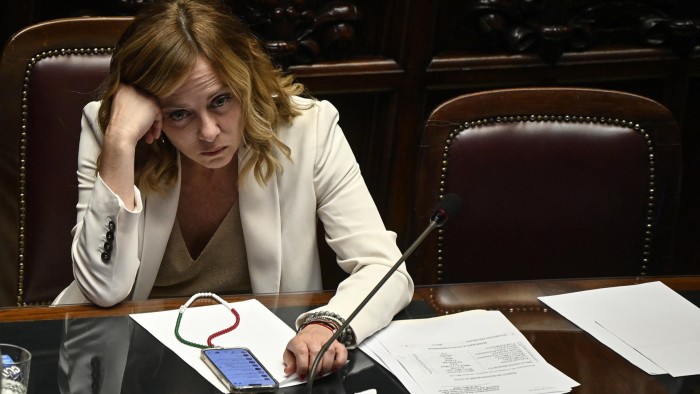Giorgia Meloni races to finalise budget to affirm markets’ faith in Italy

Prime Minister Giorgia Meloni’s government is racing to push through a budget that fulfils tax-cutting pledges while trimming its deficit, as Rome seeks to maintain the market’s confidence in Italy’s fiscal rectitude.
Rome’s final effort to settle on next year’s budget, which must be approved by parliament by December 31, comes amid a sharp turnaround in investor sentiment towards Italy after the jitters that initially greeted Meloni’s election.
Italy, which was put under the EU’s excessive deficit proceedings this year, has set out a fiscal consolidation road map for curbing its budget deficit from 7.2 per cent of GDP last year to less than 3 per cent by 2026, bringing it in line with Brussels’ stability and growth pact.
With parliament set to debate the 2025 budget this week, investors are optimistic that Meloni — whose coalition holds a large majority — can keep the country’s finances in check and are buying Italian government debt for prices that reflect that faith.
The additional interest that Italy pays on its 10-year bonds compared with Germany’s benchmark debt — a closely watched gauge of the perceived risk of Rome’s debt — has fallen to 1.1 percentage points, from a peak of more than 2.6 percentage points in September 2022, when the general election that swept Meloni’s government to power took place.
“They [will be] able to push through their reform agenda,” Eiko Sievert, senior director for sovereigns at Scope Ratings, said. “The question is how far can they pursue fiscal consolidation that is still acceptable to the voter.”
The calm in the market for Italian sovereign debt comes as neighbouring France confronts a political crisis that sent its own spread with German debt to a 12-year-high and led to a Moody’s ratings downgrade on Saturday.

Demand for Italian bonds may have been bolstered by fears that political gridlock in Paris will hinder the clean-up of France’s own public finances.
“Italy has been really a source of stability — a surprise to some in the market,” said Robert Dishner, a senior portfolio manager at Neuberger Berman. “There has just been a lot of noise elsewhere.”
Finance minister Giancarlo Giorgetti reiterated Rome’s commitment to fiscal prudence last week, while admitting that Germany’s economic woes and uncertainty over US president-elect Donald Trump’s policies are weighing on Italy’s own growth, which has been slowing.
“The world unfortunately is going through a very complicated phase not just geopolitically, but in economic terms,” he said. “We on our part are continuing with our policies of responsibility and seriousness, which has brought us much greater international recognition than we are given domestically.”
Pietro Braicovich, executive vice-chair at DC Advisory, a boutique investment bank, said the Meloni government’s fiscal rectitude had created a “virtuous circle”, whereby the sharp reduction in the spread — coupled with the European Central Bank’s rate-cutting cycle — was dramatically lowering the refinancing costs for Rome’s huge debt pile.
That, he said, was freeing up money to spend elsewhere, reducing the pressure for painful, contractionary budget cuts. “Normally, if you reduce the deficit you are doing a restrictive economic policy. But in Italy, the market has seen the potential reduction in the deficit as an expansive tool.”
Italy’s long-dated bonds were hovering around 3.4 per cent as of Friday afternoon, down from about 4 per cent a year ago, which Braicovich said was in “a massive gain” in interest costs saved. “It’s a huge amount of money,” he said.
Nevertheless, Meloni’s government may not be able to honour all of its pledges.
Rome had hoped to squeeze more revenues out of small businesses and the self-employed to fund a small €2.3bn income tax cut for middle-income salaried workers, as sought by Forza Italia, a junior coalition partner of Meloni’s Brothers of Italy.
But that cut has been deferred after a tax amnesty scheme targeting the self-employed failed to mop up the expected revenues and instead drew the ire of deputy prime minister Matteo Salvini.
Salvini’s League party criticised the threatening tone of 700,000 letters sent out to suspected tax evaders urging them to enrol in the scheme.
Ernesto Maria Ruffini, who has lead Italy’s revenue agency since 2020, resigned on Friday, complaining that politicians had vilified the fight against tax fraud.
Meloni’s government is now aiming to deliver a corporate tax cut for businesses that retain profits to reinvest or increase employment — a measure that will cost an estimated €400mn, for which Rome is now scrambling to secure funds.
The funds are expected to be found over the coming days.
Florian Ielpo, head of macro strategy at Lombard Odier, said he expected the spread between German and Italian debt to narrow further next year, as more rate cuts from the ECB put investors “on the hunt” for higher relative returns.
“The quest for yield is what’s important,” Ielpo said. “France and Germany are lagging behind the periphery going into a year which will be more difficult [for the Eurozone] because of Trump.”
Ielpo added: “As long as you have someone doing worse than yourself, you’ll be in a good position.”
Additional reporting by Ian Smith and Rafe Uddin in London
Data visualisation by Keith Fray and Janina Conboye
#Giorgia #Meloni #races #finalise #budget #affirm #markets #faith #Italy





